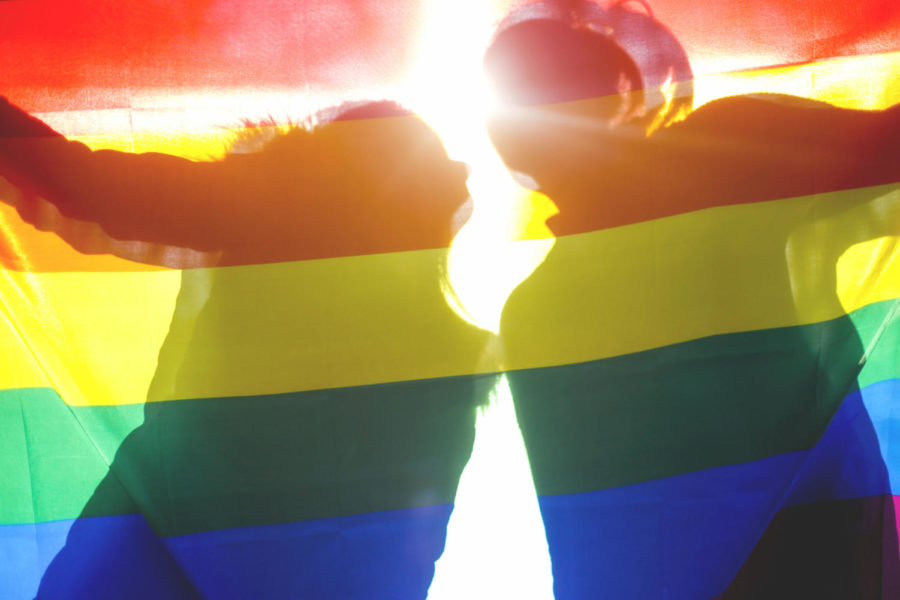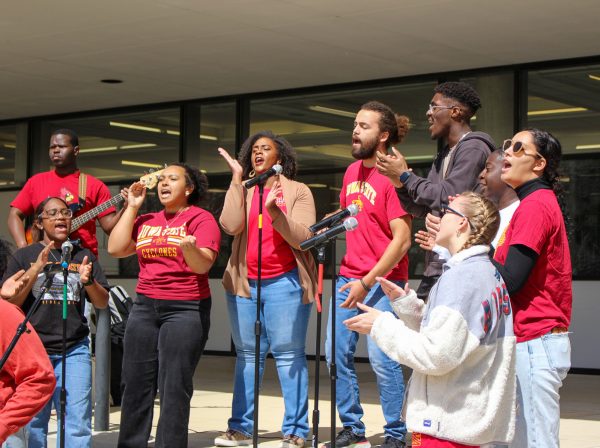A Dose of Pride: Madison Mason
A Dose of Pride: The Iowa State Daily’s Pride Month series throughout June.
June 23, 2021
Overcoming adversity
I’ll be honest, I haven’t dealt with much adversity when it comes to my queer identities.
My parents, friends, family, mentors, etc. have been nothing but accepting when I came out as queer and gender non-conforming. They have supported, uplifted and loved me, no matter what.
So I don’t have a sad story in regards to overcoming adversity because I have had so many positive experiences and opportunities to thrive with my queer identities.
Now, that’s not to say I haven’t experienced homophobic situations, where slurs have been thrown my way, or physical altercations have happened. And while those situations have been terrifying, I was able to quickly overcome them due to my overwhelmingly positive support system.
However, I want to take the opportunity to discuss adversity that a lot of LGBTQIA+ people face that I never had to, as well as some resources for those in need of them.
Houselessness
LGBTQIA+ youth are one of the highest portions of the houseless population due to circumstances like unaccepting families who have kicked them out as well as other outstanding circumstances. Many queer youth experience houselessness twice the amount as their straight, cisgender counterparts, and they make up around 40 percent of the houseless population worldwide.
LGBTQIA+ youth experience houselessness and do not receive the same opportunities that other houseless individuals may have. LGBTQIA+ people, especially youth, have great difficulty finding shelters that accept and respect them, and these individuals experiencing houselessness are often at a heightened risk of violence, abuse and exploitation compared with their heterosexual peers. Not to mention, transgender youth are particularly at physical risk due to a lack of acceptance and are often turned away from shelters; in some cases, signs have been posted barring their entrance.
Some resources for queer houseless youth in the state of Iowa can be found here. As well, other resources such as YSS or Iowa Homeless Youth Centers are readily available for houseless queer youth.
Mental health
Mental health issues are extremely prevalent in the LGBTQIA+ community. Whether it’s a lack of a support system, mental hardship surrounding their queer identity and more, many folx who are part of the queer community suffer from mental health issues and aren’t provided with resources.
LGBTQIA+ people have been reported to use mental health services at 2.5 times higher rates than their straight counterparts, and LGBTQIA+ youth are four times more likely to commit suicide than their straight and cisgender counterparts.
One Iowa provides a list of health and wellness resources readily available in the state of Iowa for LGBTQIA+ folx, including mental health services. Specifically at Iowa State, The Center for LGBTQIA+ Student Success provides resources for mental health and wellness for students.
There are also campaigns and nonprofits, like The Trevor Project, which provide resources and mental health services for queer youth, as their goal as an organization is to end suicide in LGBTQIA+ youth.
Transphobic violence and racism
Racism and gender violence are issues the queer community faces heavily. Within the LGBTQIA+ community and outside of it, Black transgender women face high mortality and gender violence rates. Black transgender women specifically have a life expectancy of only 35 years old.
Yearly, there is a day of remembrance for transgender folx who have died due to anti-transgender violence, and every year, a majority of the names and faces on that list consist of Black trans women. In 2019, I wrote an article about the lives lost that year, in which all 22 reported deaths of trans people had been Black trans folx, 21 of those deaths being Black trans women. And in 2021, 29 Black trans individuals have been killed due to anti-transgender violence.
Black trans people, specifically Black trans women, face extreme adversity and violence worldwide. They experience high rates of houselessness, unemployment, poverty, poor health care, police brutality and sexual assault, and yet they are also the folx who are often overlooked the most.
The Black Trans Advocacy Coalition has more information about these issues on their website.
A map of transgender resources can be found here, and Iowa State resources for trans students can be found here.
There is also a new organization fighting for the mutual aid of BIPOC trans folx in Iowa, and their Instagram can be found here.
These three issues are just a few examples of adversity that many queer people face. Many people assumed that queer issues died when gay marriage was legalized in 2015; however, queer issues are more prevalent than ever.
I’m lucky enough to not only have an amazing support system, but also having white privilege that thrives within and outside of the LGBTQIA+ community. However, many people don’t have these privileges, and people within and outside of the community should be fighting for and supporting queer people who face these and many other adversities.
So take the time you have left of Pride Month, as well as year round, to educate yourself about issues that LGBTQIA+ people face and support solutions and resources that are available for these queer individuals. Queer liberation is a movement fighting for the equity of all queer persons, especially those facing adversity and marginalization.

















